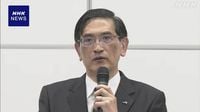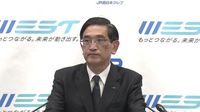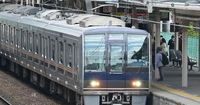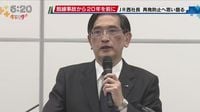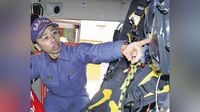As the 20th anniversary of the Fukuchiyama Line derailment approaches, JR West President Kazuhisa Hasegawa reaffirmed the company’s commitment to enhancing safety measures. The tragic accident, which occurred on April 25, 2005, resulted in the deaths of 107 passengers and left 562 others injured. Hasegawa expressed deep remorse, stating, "I deeply apologize to those who died, their bereaved families, and those who were injured. The heavy responsibility as the causer of the accident will continue from now on," according to reports.
In light of the upcoming anniversary, Hasegawa emphasized the importance of preventing such incidents from happening again. "We will not forget our position as the causer of the accident and will work to improve safety," he stated during a press conference on April 18, 2025. This commitment is underscored by JR West's substantial investment in safety measures over the past two decades, totaling 1 trillion 900 billion yen. The fiscal year 2025 is projected to be the largest single-year investment, doubling the level of spending from fiscal year 2005 when the accident occurred.
As part of their ongoing safety initiatives, JR West plans to install platform doors at several stations, including Kobe, Akashi, Nishi-Akashi, Shin-Sanda, and Maiko, from this fiscal year through 2027. This measure aims to enhance passenger safety and prevent future accidents. Hasegawa remarked, "We want to ensure that safety is prioritized at every level of our operations. Our employees must recognize the gravity of our past mistakes and learn from them."
The Fukuchiyama Line derailment remains a pivotal moment in Japan's rail history, and the impacts of that day continue to resonate. Hasegawa noted that approximately 70% of JR West's current employees joined the company after the accident. To ensure that the lessons learned are not forgotten, he emphasized the importance of employee education programs. These include visits to the accident site and discussions with bereaved families, which are crucial for instilling a culture of safety within the organization.
In addition to the safety measures, JR West is also working on a facility in Suita City, Osaka, to preserve the train cars involved in the accident. Set to be completed by December 2025, this facility will not be open to the public, as Hasegawa explained, "Some bereaved families cannot bear to see it themselves, and those who are generally allowed to see it cannot bear it any longer, so in principle, it will not be open to the public." This decision reflects the company's sensitivity towards the feelings of those affected by the tragedy.
As JR West continues to implement these safety enhancements, the memory of the victims remains central to their mission. Hasegawa stated, "We will continue to work diligently to ensure that a tragedy like the Fukuchiyama Line derailment never happens again." This commitment is not just about compliance; it is about honoring the lives lost and the impact on families and communities.
Among those affected by the accident was Takeda Kinoshita, a former rugby player whose friendship was tragically cut short when his friend, Kinoshita, died in the derailment. Now a firefighter, Takeda has dedicated his life to promoting the importance of life and safety. Reflecting on the past, he recalls the day of the accident with deep sorrow. "I rushed to the scene after hearing my friend was on board, but I could only watch as the rescue efforts unfolded. I wished it were all a mistake," he said.
As the anniversary approaches, Takeda continues to share his message with children visiting the fire department, urging them to value their lives and the lives of others. He often says, "You never know when something might happen, so cherish every moment." His story is a poignant reminder of the human cost of the tragedy and the ongoing need for vigilance in safety practices.
JR West's efforts to improve rail safety are not just about technology and infrastructure; they are about fostering a culture of care and responsibility among all employees. Hasegawa's leadership will transition as he takes on the role of Chairman following the general meeting of shareholders in June 2025, with Vice President Nobuharu Kurazaka set to become the new President. Kurazaka has been instrumental in addressing the needs of victims' families and will continue to prioritize safety as he steps into this new role.
As JR West reflects on the past two decades since the Fukuchiyama Line derailment, it is clear that the company is committed to ensuring that the lessons learned from this tragedy are not forgotten. With ongoing investments in safety, employee education, and a focus on the emotional well-being of those affected, JR West aims to create a safer future for all passengers.
The Fukuchiyama Line derailment serves as a somber reminder of the importance of safety in public transportation. With the memory of the victims at the forefront of their mission, JR West is determined to honor their legacy through continued vigilance and improvement in safety practices.
